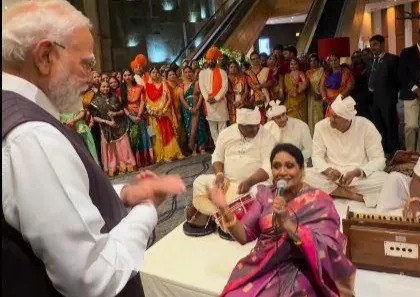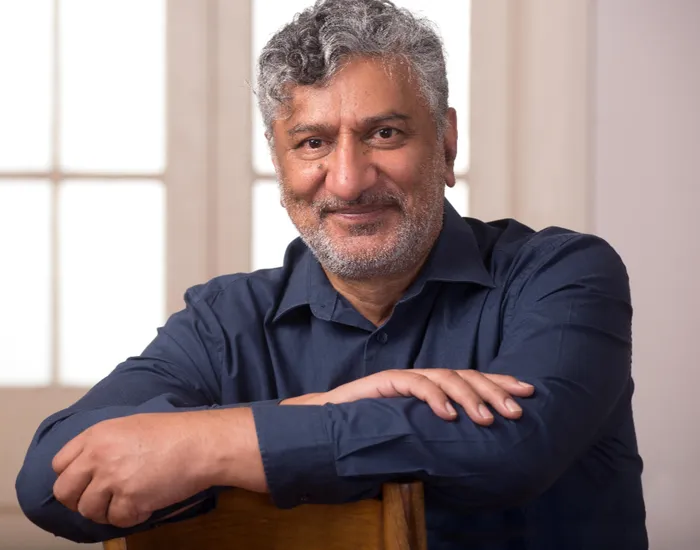
South African singer and dancer Kumari Ambigay singing the popular song Ganga Maiya to Indian Prime Minister Narendra Modi
Image: Facebook
WORLD leaders from across the globe have hailed South Africa’s hosting of the G20 Summit as a triumphant event.
Not even the tantrums thrown by US President, Donald Trump, could detract world leaders from a commitment of working towards a common purpose at the summit.
Packed with high-level deliberations and side meetings led to a victorious closure of the summit.
Down-played, however, beneath a very focused political agenda was a cultural programme which gave world leaders an insightful experience and understanding about the diversity that weaves ordinary South African people together into a singular and rich tapestry rooted in multiple histories, traditions and practices carried through generations.
It was thoughtful, relevant and smartly inter-related cultural programme with the political gravitas of the summit albeit it that it was downplayed.
For example, India’s President Narendra Modi was welcomed at the G20 Summit by South Africans in a very dignified recital of the Ganga Maiya – a devotional tribute to the River Ganges in India.
This recital was not just a random cultural performance to show the connection between South African Indians and the motherland in a week when South Africans were marking the 165th anniversary of the arrival of indentured Indians to South Africa.
Although the Ganga Maiya deeply connects Indians across the diaspora with India this emotionally evocative song resonates with other global traditions where sorrow is turned into strength.
The slow, solemn and mournful dignity portrayed in the Ganga Maiya invokes the same emotional energy as the African-American spiritual, “Swing Low, Sweet Chariot,” which has its roots in the trauma of the transatlantic slave trade.
The rendition of the Ganga Maiya during President Modi’s visit to the G20 Summit had symbolic relevance. It was a demonstration of South Africa’s passionate vision to lead the summit in a way that it connected and represented the histories of all nations across the globe who hold the capacity to turn remembrance into unity; and who embrace the power of culture to turn collective pain into global solidarity.
The video clip that went viral on social media was a powerful way of reminding global leaders that public diplomacy is not only political but instead, it is profoundly human. Songs such as the Ganga Maiya represent all communities who carry trauma, resilience and an enduring hope across geographies, time and generations.
In a complex time with wars, genocides and political bullying by a few rich nations and an arrogant political leadership byDonald Trump the viral video clip is an ordinary people’s desire to reclaim unity by acknowledging past and current traumas.
The G20 Summit was an important moment in South African history.
It gave global leaders an opportunity to experience South Africa’s moral leadership, our nation’s political steadfastness, our journey to recovery from our past traumas, our commitment to a just order and our desire for a culture of human rights that is inspired by our past struggles and our Constitutional Democracy.
The cultural diplomacy initiatives that underscored the experiences that world leaders enjoyed in South Africa is as equally important as the declaration to which they all committed themselves to at the closing of the summit.
The recital of the Ganga Maiya led by veteran South African artist and cultural worker, Kumari Ambigay, or France’s President Macron’s visit to the Johannesburg Art Gallery are significant parts of an artistic and cultural programme that was deeply and intelligently anchored in the summit.
It reminded us that the G20 Summit wasn’t a space only for politicians. From the welcome dances on the tarmac at the O R Tambo Airport to the individually curated cultural programmes for world leaders this was an event where artists were very much a part of shaping the global community’s history and its pathway to the future. It is important that the various cultural performances that leaders experienced during their visit to South Africa goes beyond just video clips on social media but that instead, it becomes a written document that archives the significance of each performance and its relevance, testimony and impact at this historic event.
It must be an archive that must continue to inform how South Africa grooms a next generation of cultural leaders and our nation’s cultural diplomacy strategy.

ISMAIL MAHOMED
Image: SUPPLIED
Ismail Mahomed is the Director of the Centre for Creative Arts at the University of KwaZulu-Natal.
He was formerly the Artistic Director of the National Arts Festival (Makhanda) and CEO of the Market Theatre. A multi-award winning arts leader he has been awarded the Naledi Theatre Lifetime Achievement Award, the KykNet Fiestas Lifetime Achievement Award and the World of Music, Arts, Dance (WOMAD) Lifetime Achievement Award.
** The views expressed do not necessarily reflect the views of IOL or Independent Media.